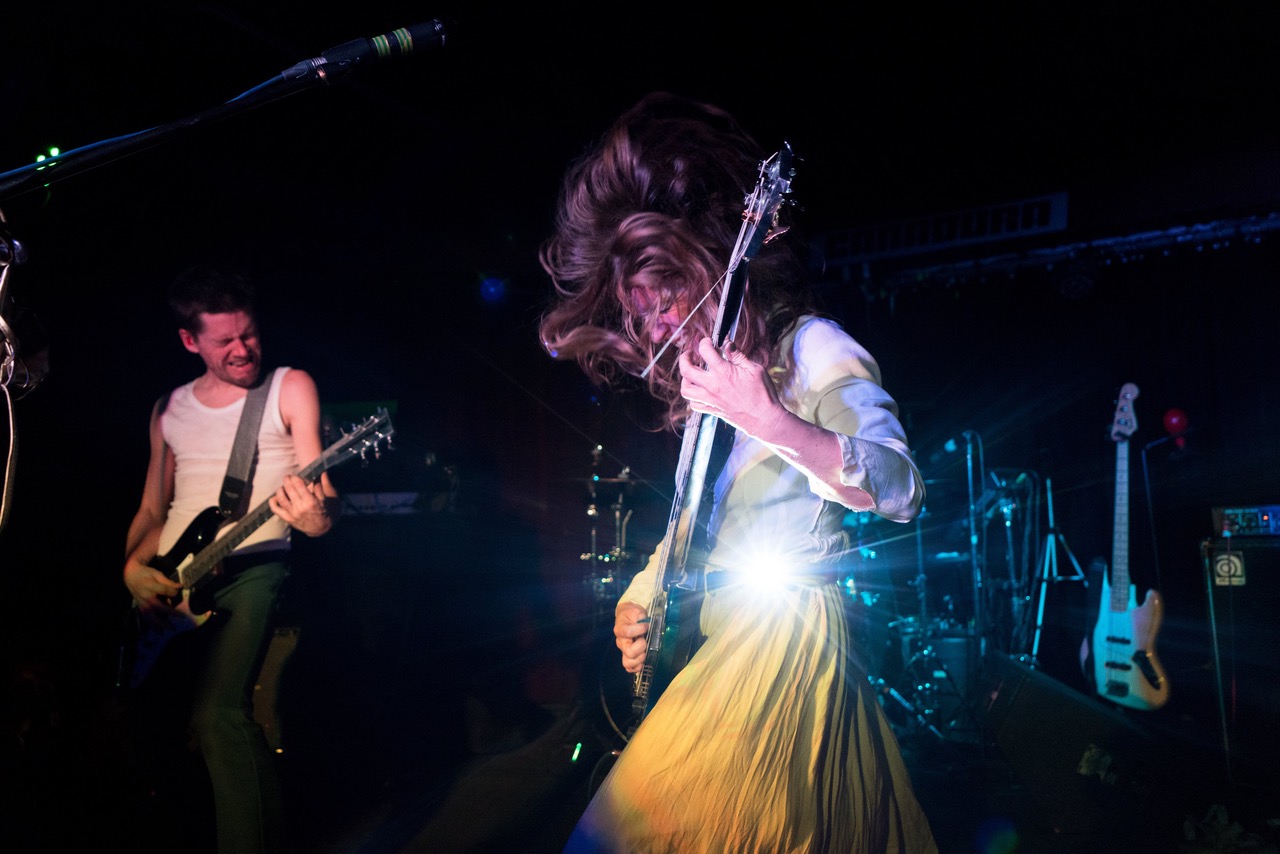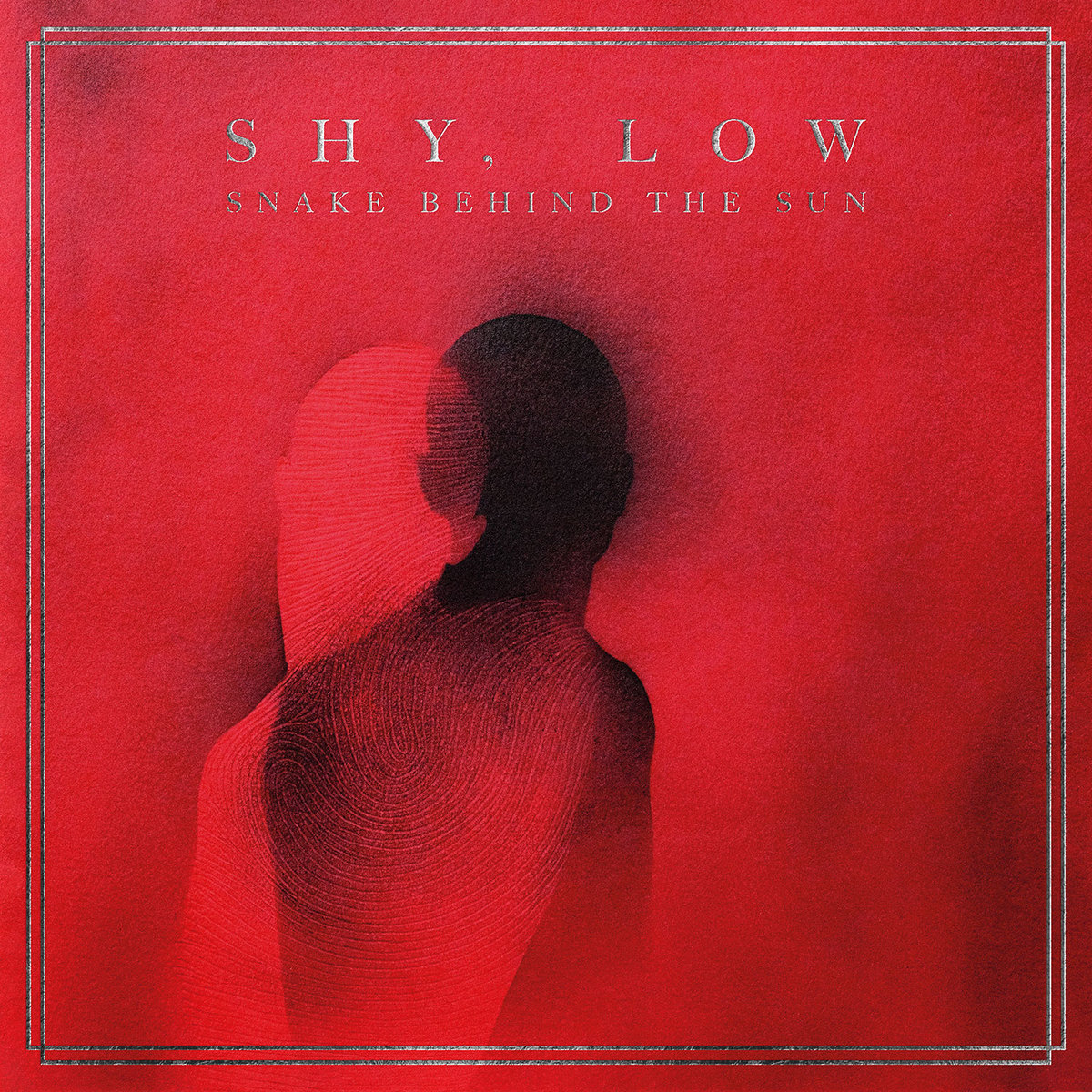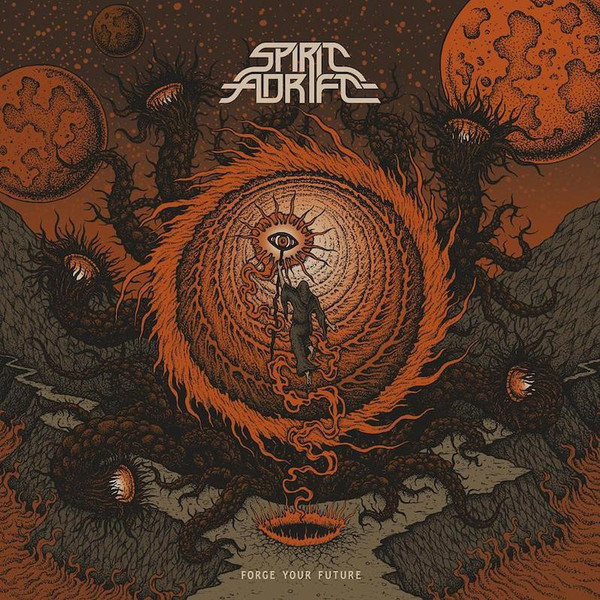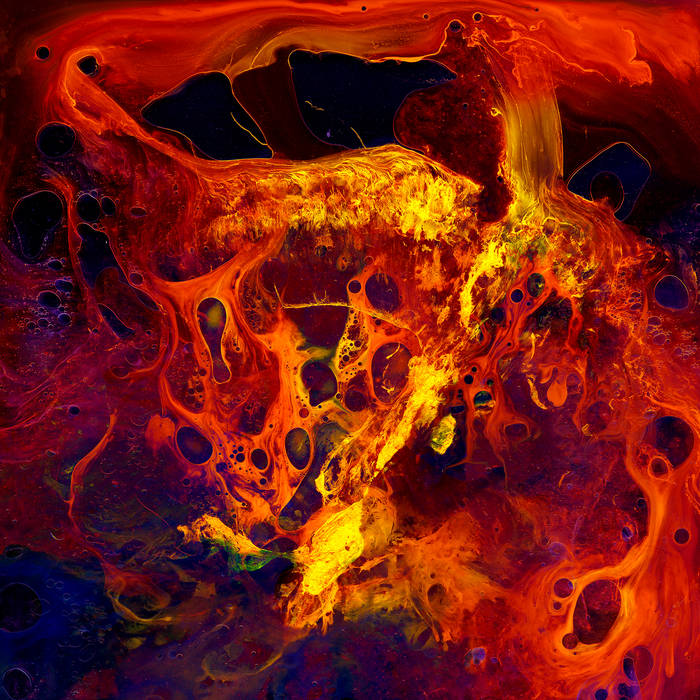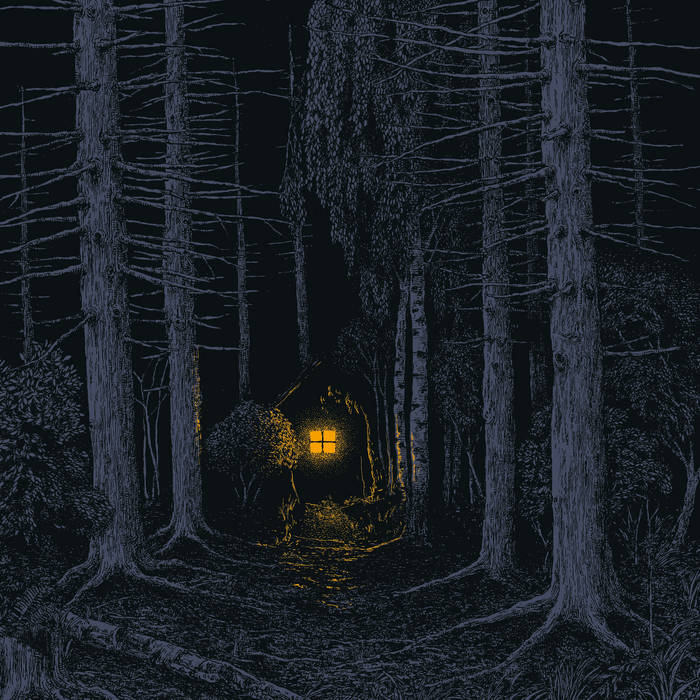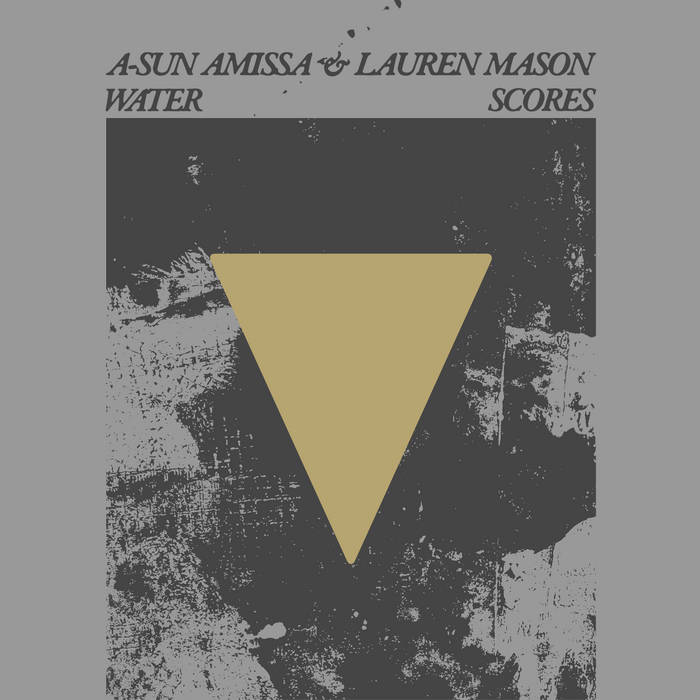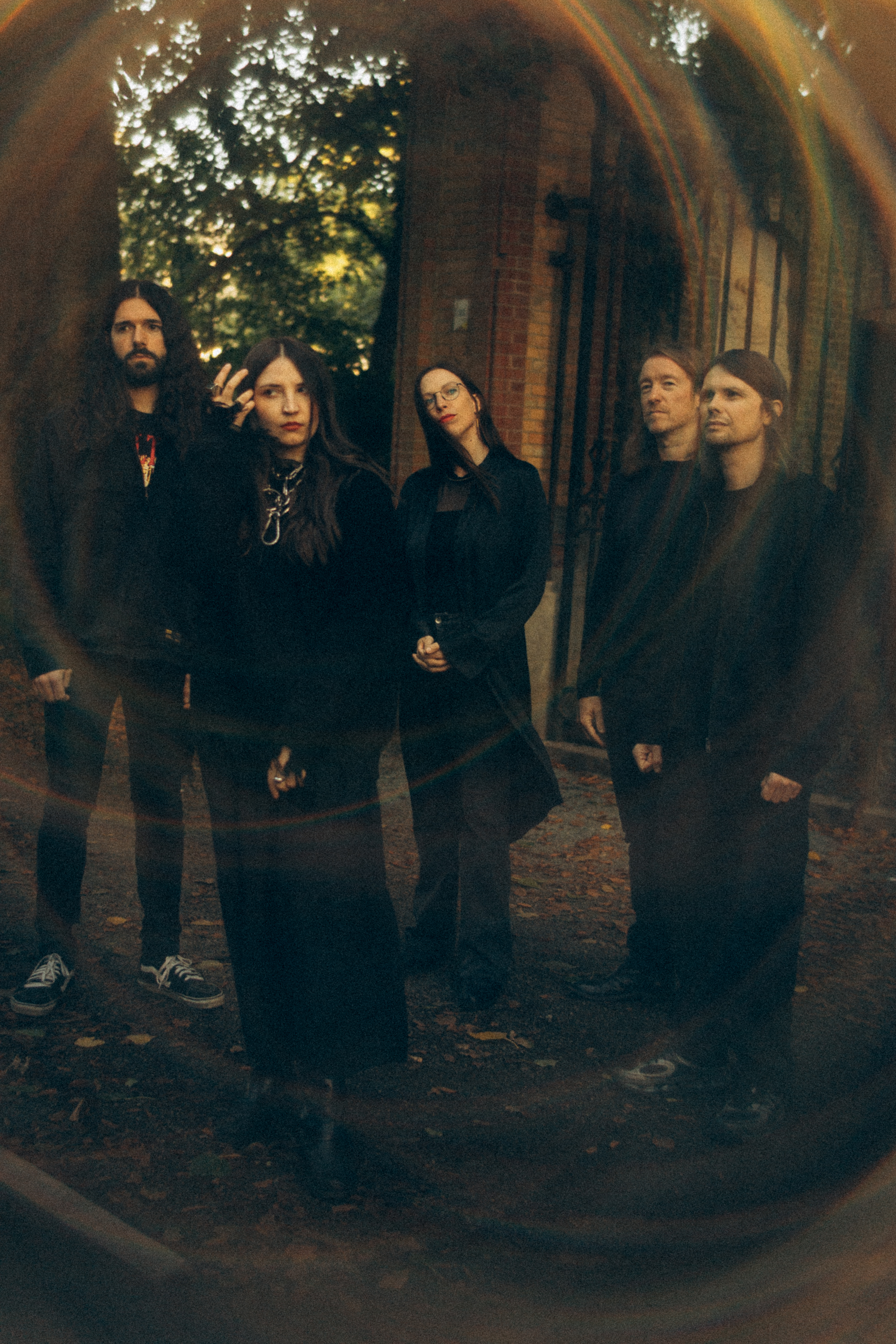With seemingly inexhaustible energy MoE has toured just about every corner of the world as if being possessed by Guro Skumsnes Moe´s bass. Through chanting and screaming the exorcism has taken place in front of crowds in Mexico, Japan, Australia, China, South East Asia and Europe for more than a decade.
No exorcism has so far made MoE silent and the music continues to jump the lines that cross trails deep from the dark Norwegian landscape to music like Henry Cow, Giacinto Scelsi, Black Flag, Swans, Neurosis and SUMAC. The music seeks the natural, spontaneous and dark sides of mankind, while the melodies sometimes herald hope in the distance.
We here at Veil of Sound are proud to premiere the first song from their upcoming album, The Crone.
And we are proud to present this in-depth interview with Guro Skumsnes Moe where she unveils her thoughts and reflections on the band, touring, composing, playing, collaborations, the mobile tour where they are playing out of their car around Norway (see video below) and much more.
When you formed the band in 2008 you were already a very influential bass player and composer on the Improvisation, Noise and Experimental Jazz scenes in Norway and you have also curated festivals. In an interview you said that the formation of MoE as a trio with bass, drums and guitar happened, because you wanted to make more structured music revolving around Rock and Punk, but with elements from Noise and improvisation. How has this vision developed over the years since the first release in 2011?
2008 was the starting point of the band with the release of a blue 7” titled Eyes/Lies. This was a quintet with Børre Mølstad on tuba, Ole Jørgen Bardal on sax and different drummers, Kenneth Kapstad, and Ivar Loe Bjørnstad. The first version of the band as a trio, and the first album, was with drummer Sveinar Hoff, [who is] really an amazing drummer.
Many things actually led to the starting of MoE. When growing up, both me and Håvard had a background from playing in Rock bands. And as [the] next question opens to, I fell into the ocean of No Wave bands and felt smitten by this urge of just doing, creating songs, which where a catalyst for starting MoE. And wanting to create something more powerful, feeling that the recipe was putting out the immediate clarity of Rock songs but somehow maintaining the execution of the moment, the absolute presence and layers of equal sound, being what I cherished most from improvised music and Noise music.
Creating something that always challenges us, I would say, has stayed with MoE this whole time. And being made visible through all the albums and collaborations, the tours. It also co-happened that we were invited backstage at ØYA fetival in Oslo that same year because we had collaborated with the trumpet player from Sigur Rós, Eirikur. Seeing the wonders of night liner and rock life, we thought pure improv would never take us there. Our vision has somehow stayed the same with our inspirations and ways of creating always evolving music. It´s a process. I love being on a continuous process which I hope will never stop.
Were there any bands or artists that inspired you to form MoE?
At the time the band MoE was being born, I was swallowed up in reading about the bands in the No Wave era from New York. I seem to discover many bands as late as I did with these bands as well. The starting point was reading about Suicide. Their unstoppable drive towards something was mesmerizing to me. I don´t think I can explain why. It just made sense and ignited some sparks in me from their ethos. What stood out was their, and other bands’ of that time, absolute necessity of doing it. Things just were made possible through the urgency to create, and of course through the conditions in New York at the time when this all happened. Nothing is being created in a vacuum. The urgency I guess was created because of these same conditions. Suicide says this in a song or a song title, I don´t remember which, “escapist culture”. Our song “Let Them Dance” from Oslo Janus 1 and 2 is a tribute to Suicide. I´ve taken some words from them and also my interpretation of the time they were products of.
What do you think about acts like Einsturzende Neubauten, Killing Joke or John Zorn/Naked City?
I have to admit I don´t have personal relationships to their music, but what I know is their extreme statements into shaping a lot of music. Strange that some names are just followed by a depth because of their own impact in music history. I know my time will come to be swallowed by these names as well. I am more inspired by their energies and their members´ side projects. I have been collaborating with Fred Frith, bass player in Naked City. This collaboration has been extremely crucial to me. He opened up important questions to make me see where I want to navigate with what I do. Just by the simple question “Why are you doing this?”.
For bands and performing artists, the pandemic has had a severe impact. As MoE is a band with musicians that seems to thrive from tours it must have been a difficult period. I guess there were a lot of cancellations to do. But even so, you entered the studio and recorded this new album, The Crone. How was the process behind the compositions of the songs on this new album? Was it any different from the other albums?
The Crone has been a long working project. The band stuff was composed and recorded before the pandemic hit and mixed and mastered during the first year of Covid-19. And every song lyric has been made in various places on tour throughout the world. I never planned for this, but it just happened this way. A really big difference has been composing it on various stages, as the process was spread out on such a long period of time. We also composed new material during the mixing period.
When entering the studio – how clear-cut is your vision of what will come out in the end? Do you plan any space for improvisation ahead of or during the recording process?
In the beginning we rehearsed until we fainted because we could only afford a day or two in the studio. Like when we recorded the album 3 at Athletic Sound. Back then we only had two days, but recorded two albums and started the mixing. Studio albums have been pretty much all composed beforehand.
The Crone has had more adjustments in the mixing process than any other album, actually. All the Oslo Janus-series (besides 1 and 2) are spontaneous compositions there on the spot, with very little framework. Recording Janus 3, we drank too much Scotch the day before the recording in Tokyo and somehow only the slow heavy stuff worked out. Also, because during the recording in the studio GOK in Tokyo they had massive great amps and dark drum sounds. For Oslo Janus 4 we used the equipment in the same way - that is adapting to the location and the old-fashioned style which they were in at Sound Recording Studio in Australia. That one was recorded more or less like a 60´s Jazz album, everything mixed in the recording session. The drum sound was amazing, but we all stood in the same room so both me and Håvard´s amps were turned down really low, almost so we couldn´t hear each other, to get as much use of the drum sound from the room. Our composing tool was to set a time frame on each song. I had made some lyrics throughout the tour which became the song lyrics. I want to do another session like that where we just throw ourselves into it. Some frames, a set of different possibilities of riffs and a bunch of lyrics and to work with a producer. I really am looking forward to recording that record! Cut loose and trust the moment.
The Oslo Janus-series will come to an end in 2022 with Oslo Janus 5 being a double album, one with new material and the other with remixes from our four previous albums in the Oslo Janus-series.
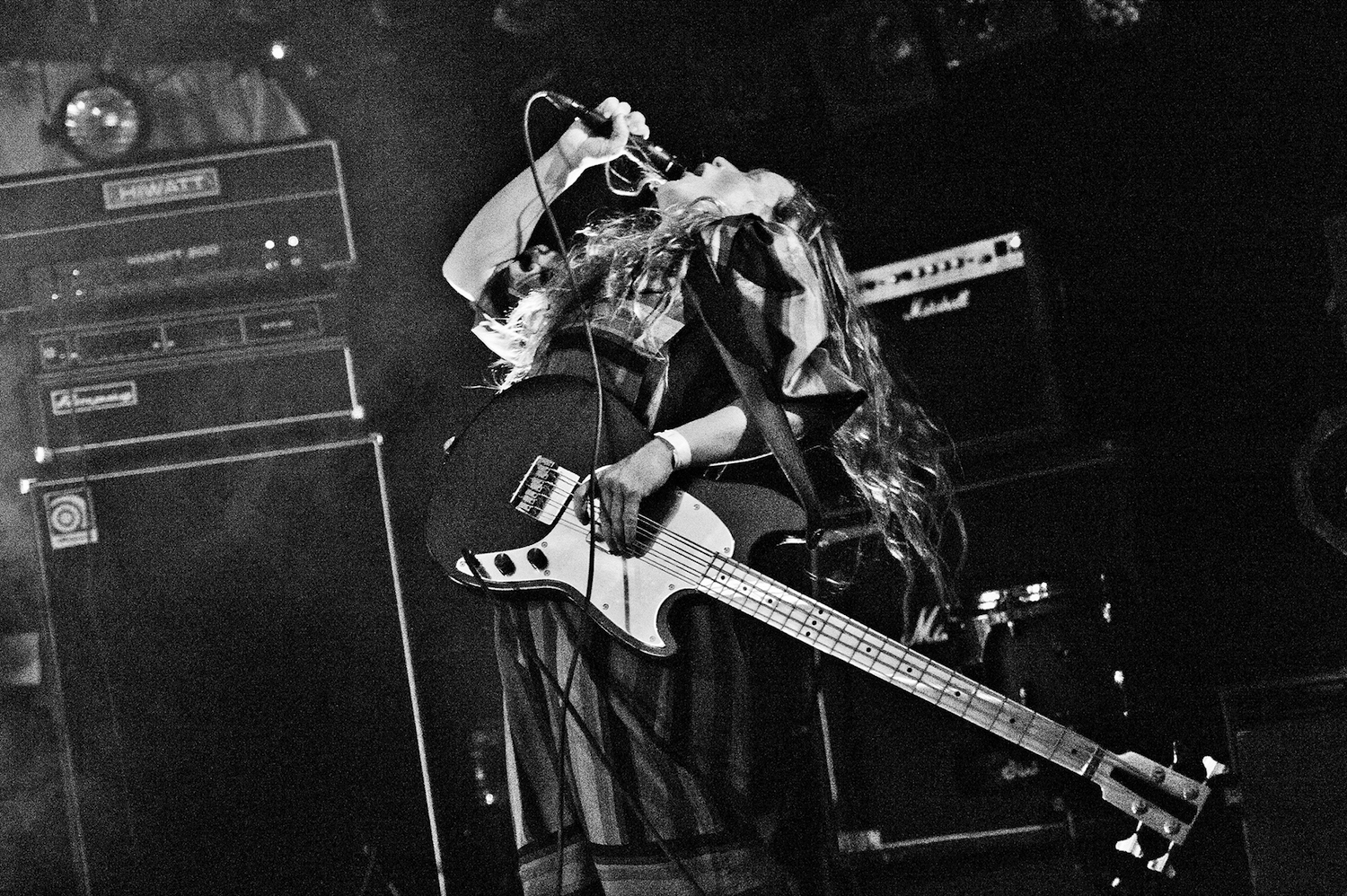
How difficult was composing and recording due to the pandemic? Where was the album recorded?
I think as we have never depended on anyone (which of course is a lie looking at it in the big picture, but in terms of an apparatus or someone needing or wanting something from us), nothing has been different in that aspect. Beside not going on tour and of course not being pushed by new meetings, new bands, new food etc.
Sometimes I think of “what is my culture”. And I feel I am a lot of cultures. The subtle or dramatic differentiations of how cultures also co-exist within a country, have opened my perspective which I am utterly grateful for. It has made me a bit confused about not having these differences close to me the last year. But working and touring with the figure theatre company Plexus Polaire on the performance Moby Dick in France has been the perfect opening into more cultures. Not having these perspectives on life close to me has been a sorrow during the pandemic.
The album was recorded at Athletic Sound in 2019. As with MoE 3 and Oslo Janus 2, most of the songs were recorded live in one day at Athletic Sound, Halden. String instruments were recorded at my mother´s cabin in 2020, some vocals recorded at Tunellen Studio and in our apartment. Percussion was recorded at Pinquin´s headquarter in Oslo. We worked with Lyrre Laastad and Karl Klaseie at Øra Studio which was a super combo.
I have always looked at modern poetry as basic research in the language to develop the understanding of language and the language itself. I think I could say the same about improvisational music, noise, experimental jazz etc. It researches the musical range, new soundscapes and develops the music. And with MoE it is like you somehow do basic research in the rock and punk genres, especially how the bass and the voice can be used. How would you comment on that?
Poetry is to me what makes everything connect. The bridge between everything. Daring to fall and to be misunderstood, yet with deep roots, perhaps because it is a bridge between everything. So yes, it can create new understanding, I agree. For our music I feel we are following a creative research into how every song is being made. I feel we investigate in every song what is in it, what does it need. Some songs take years and some are done in the composing process before rehearsing it.
Could one imply that you are gathering these basic elements and knowledge of the languages Punk and Rock in order to then implement some of these elements in your regular music?
Then I understand it as our regular music is the noise and improv? The Noise aesthetic is a cool way of composing, also how to live your life. A co-existence of equal layers of sounds. With variations and nuances. Perhaps this is why people don´t find the songs in our songs sometimes. Some songs are heavier and like simpler blues, yet perhaps always with layers, which we don´t look upon as layers.
I start to see how I need a density of movable, rich character, not just in my music but also in life. Like being addicted to spicy food. I love when the outcome of a song is not obvious, that you can be surprised. That it took you to a place you couldn´t have predicted. A lot of genre tricks can put the song into a whole history and context, intended because you are going for that kind of audience, that kind of venues, somehow following someone who has walked that path before you.
And a lot of new inventions can be created this way as well. It has somehow never been of interest. I have been writing songs from an early age on and have a wide range of styles. So, I could write a Pop album if I wanted to. Somehow my attention and inspiration for the last fifteen years have been towards Noise and Improvisation and merging that with Rock songs. I think we, as a band, are unwilling to be categorized. I bet we have made many decisions that made the road a lot more difficult for us, wanting to protect the music from being categorized. But I am not sure if we would have managed another way.
When you live so close to the music, it becomes a part of you and sometimes it blocks the view of what you are navigating towards. Because it is a burning matter. And add to that logistics, promotion, booking, composing - it also becomes so precarious, and it can almost wear you down. Not necessarily the thing itself, but because it is all entangled with the creative matter. I have been booking, following somehow the same methods as when I am composing for years, and I mean it has become an emotional mess for me at times. Luckily getting through some phases of heavy touring and knocking the head on the wall of your own methods, it has become more easy to lift the view and go towards the flow of things. I feel I am in a good spot now: with control.
So, I have to ask something because some time ago I heard an interview with you in which you (probably with a smile) described your music as Blue Metal. With this I think you connect your music with the fierce rawness of Metal and Punk and with the fragility of Blues. What was your intention behind that description?
Blue metal is a bastard for sure. And I like bastard things, mixing what seemingly is far apart from each other. I think it can create an unknown energy. When people have called our music Metal I have had a grin on my face because I feel we very are far from Metal. Metal, to me, is a tight-knit recipe of a very specific way of being and playing music. So, I don´t find the Soul in that music. But when putting it up to where I feel the roots of most music comes from, the Blues, then I can make sense out of it. I don´t know if Blues and Metal are opposites of each other, but they surely work under different rules.
It´s like, if you walk up and down a high-lit street you can become really good in doing that walk, but you don´t reach any further and you are not contributing in getting the view further so you actually can grow. I feel it´s not just my creative mission, but also an obligation. Coming from Norway gives me every possibility, safety-wise and economically, to become the best version of myself. As a human and as an artist. The obligation lies in always being honest, taking the risks of growing, going unknown places and to trust that this is a contribution. By pushing your angle, pushing the road you are walking, you can open up the world a bit more. I am god damn grateful that this life is possible.
You have self-published collections of poetry a while ago through your label Conradsound. How important are the lyrics for your releases? What themes do the lyrics on this new album cover?
The Crone has become the very symbol for all these lyrics. Creating a wholeness, unlike any of our albums. The lyrics are super important to me. I don´t understand why the lyrics have not been mentioned before. I feel they constantly relate to reality, even though written a long time before recording, “Let Them Dance” or “Wild Horses” for example.
On tour the lyrics keeps being added new meanings to, from events happening on tour or in the world. It makes me shiver when I feel my lyrics and reality are all synchronized. I´ve had that experience quite some times and it takes me out of my own self. Deep moments, like magnifying the presence. [My] lyrics are sometimes like cut up, suggestive and repetitive. And as a Rock concert is wild, chaotic, fragmented, I want the sum of everything to be what is being expressed, not each line of lyric one by one. It´s enough to hear phrases, and that will attach the listener to the energy that is intended to be transmitted. That´s how we are trying to do it with scenic elements as well, expanding what the ear hears. The Crone is something that I have gained more and more interest in throughout the years. It is one of the four female energies. And the forgotten one. I write all the time, it is a way of understanding.
On your albums, the bass is always the main instrument together with your vocals. Both the bass and the vocals are impressively versatile. The heavy bass and the clear vocals are, in my ears, a perfect fit. How have you developed the techniques over the years?</i>
Wow. Bass as the main instrument? I never have thought of it that way. Also, as we have consequently worked the bass and guitar sound as a tight unit. My vocal techniques have grown from absolutely no clue of how to do what to my inner resemblance of what I want it to express. Sometimes like colors or shadows, sometimes I see movements which I want to be expressed through my voice. Sometimes just the whole inside leaping out of me. And always the demand towards myself not to be present. Me as me. I only want that what I am expressing to be visible.
I am strong and can handle pain very well. I can push myself far, and have fainted more than once on stage from singing. I have always worked on how to gain more and more technical qualities into this unstoppable energy. As for bass, I studied electric bass in Kristiansand at the conservatory. But I just wanted to play double bass and certainly never with a pick. I fought quite a lot with my teacher because I was not allowed to play double bass. We started the band Art Director (the predecessor of MoE) with songs and improv and from this band I found a creative way into playing electric bass which was inspiring to me. I was a seldom and very stubborn student, I can see that now. And now I only play using picks.
We know that you have a master’s degree in improvisation, but did you also take lessons as a singer to develop your voice? On the new album, The Crone, it is like you use your voice in a different way on each song – is that intentional?
They are quite different universes, each song. Also, all the more power from recording the vocals after recording the bass, as has been the usual method; the live way. I always use a long time to decode how the vocals for each song will be. I have a more trained voice now, for good and bad. I understand why and how I treat it badly, before I only navigated towards the wanted energy. Now my voice is also a muscle that I know how to control more. I never took lessons at school, but I have taken some lessons here and there, and whenever working with vocalists I tend to dig for knowledge and tips how to gain more control. Audun Iversen, a famous opera-singer, came to a MoE concert once and really liked it, and I asked for a lesson from him which was extremely helpful.
You are a trio with bass as the main instrument supplemented with drums and guitar by highly skilled musicians. But you use more instruments than that on the album, we can hear a violin, I think, and maybe also a double bass? Are there more instruments?
As I mentioned, I never thought of bass as the main instrument. The magicians Ole-Henrik Moe and Kari Rønnekleiv have given this album a new world of sound. Hundreds of tracks of everything from octobass, double bass, cello, viola violin to picoletto violin. Ole-Henrik also contributes with contrabass trombone. I cannot praise them enough. They are the most incredible musicians and humans to work with. They instantly hear what textures of open scale sound spectrums each track needed and composed it during the session. I don´t know how many records in Norway where they have contributed, from Ulver to André Bratten. They deserve the uttermost credit for the generosity of their geniality.
You are known for your countless collaborations with other musicians from many genres. Who are the musicians that participate on this new album, besides you and the regular guitarist Håvard Skaset?
Partner in Crime Håvard Skaset and myself have built this band from the beginning. Joakim Heibø Johansen on drums who created his unique style giving MoE some rich and always different rhythmic ground. He played in the band from 2012 until 2019. Kari Rønnekleiv and Ole-Henrik Moe on various string instruments and contrabass trombone. Ane Marthe Sørlien Holen on percussion instruments, vibraphone and marimba.
Do you ever use your four meter high octobass on the MoE albums? If yes, how does that impact the sound? I ask because the octobass also has notes so low that the human ear cannot hear them, but is audible, as I have learnt, due to the overtone they produce.
It´s on some albums yes. On Examination of the Eye of a Horse and on The Crone. It´s deepest tone is 16htz. Your ear cannot hear the substantial tone, only the overtones. So, the exciting thing is how these overtones blend into the other instruments, tones and overtones. This is the really cool thing with the octobass, because it can create a whole different and more rich timbre which is unique. Somehow the deepest tone when playing with other instruments, you hear it best when it stops playing. Timbre is actually what The Crone is all about when I think of it.
So, about touring, as you really are a touring band. You have really toured all over the world with MoE – many times throughout Europe, Asia, South America, North America, recording in Mexico, recording in Japan, recording in Australia. How does this touring, when you also collaborate with local musicians, impact on your music and on this new album?
It marks us. And tours are crucial for the development of our music. Being on tour in Japan is completely different than being on tour in Mexico and this impacts how and what I write. Like our album 3, recorded right after coming back from the first tour in Mexico, would never have been the same without this encounter with the Mexican culture and audience. It all opened up, the water started rolling on the wheel. On the other hand, you have Examination of the Eye of a Horse giving tribute to the encounter with Japan. Every song on the new album The Cronehas lyrics written on tour. “The Crone” in Norway and the USA, ”My Cold War” in Japan, ”Beautiful Stranger” in Mexico, ”Silver lining” in Singapore, ”When the Levee Breaks” in China (the lyrics were taken out), ”The Obscure” in Australia, ”White Rose (Monster)” in France.
The pandemic hit March 2020, everything was cancelled. You are, as mentioned, touring musicians and you had to stop playing at venues. But this summer, you were (or are?) on a mobile tour, driving a van through Norway giving concerts on the way, collaborating with Hotbox who gives Noise concerts in a car. And on MoE´s Facebook page you say that this tour will also come to France. How did this concept come around?
We have thought of it for some years, to tour all of Norway. The idea towards playing out of our car came first in a dialogue with Hotbox. We have big plans for this collaboration as it can literally go anywhere. Lots of response from France has made it easy to book the next MoE Mobile Tour. I can´t wait to play in France again.
Were you tired of sitting at home not being able to play in front of an audience as I understand it is very important for your art to develop?
Not tired, but lonely in a way. Feeling useful. The joy from these concerts was hard to predict and they went beyond my wildest expectations. For one, it was extremely challenging, arriving in the backyard of someone’s house, or at a harbor, or backyard of a venue without anyone having much knowledge about us. And blasting our hearts out in front of them, with having to create the “space” for the communication without the normal context of a concert and it really felt like anything could happen. Then secondly, was the extreme joy of realizing we could play for a really varied audience, women in their late sixties, kids, youths, the regular Noise rock goers. And it felt so refreshing. I mean, we have always done it this way, pushing ourselves in order to grow. And I feel it is so important in these times to do exactly that because we are at a point in history where we have never been before. And I believe art and music are an important part of making people awake to their own reality.
You have your own label, Conradsound, as an outlet for the impressive range of musical genres you play. But you will release this new album on the new Norwegian label Vinter Records. How did that collaboration come along?
They have booked us through the festival Høstsabbat, and at the venue Revolver. Also through the collaboration I did with Hymn, where I contributed with melody and lyrics for one of their songs on their newest album. I feel we move [forward stemming] from the same ground. It also follows our ethics, growing with the surroundings. I feel both MoE and Vinter Records have everything to win with this collaboration. I think we will lift each other up.
Now a short quickfire-round.
Alanis Morissette or Patti Smith?
Patti Smith. She paved new ground and is still around.
Gong (in the 70s) or The Sex Pistols?
The Sex Pistols. Don’t know so much about Gong. So far I have not dug into much of the Psychedelic stuff. The afterwaves of Sex Pistols with Public Image Ltd gave birth to new music, and so Sex Pistols were useful that way
Tokyo or Mexico City?
Difficult. But Mexico City. From being aroused in absolute chaos from the two first times, feeling like I was crawling on the pavement because there was so much energy, into feeling calm and relaxed from that same energy.
Touring or composing?
Touring. It feels somehow like a chaotic live composition. You know the components but the timing of it are always different and requires your full knowledge and awareness. I love working on tour; all the layers that operate at the same time: logistics, meeting everyone, press, travels, and the deep joy of knowing that, when going to bed at the end of the day, you have done what motivates you to do all this - playing in front of an audience. To do something that can mean something for someone there at that moment. Composing triggers other satisfactions.
The mountains, the sea or the woods?
The sea. The sea makes me me.
Beer, wine or water?
Water. It is all you need. And makes you take better decisions.
Vinyl or streaming?
Vinyl because it allows you to focus on the act of listening. Vinyl or CD. Streaming has too many distractions to me. I cannot control that way of listening.
Black Metal or Doom Metal?
I guess Black metal. Old stuff.
Thank you for doing this!
All the best and thanks for your time
Here is a video from their mobile tour:
HOTBOX + MoE from karlsoyfestivalen on Vimeo.
And if you want to find out more about her label, here’s the necessary link: Conradsound.com

